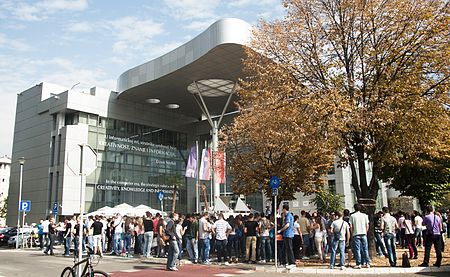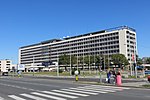Megatrend University

Megatrend University (Serbian: Универзитет Мегатренд, romanized: Univerzitet Megatrend) is a private university located in New Belgrade, the city of Belgrade, Serbia. It was founded in 1989 as the Megatrend Business School, which later became Megatrend University. In 2015, the Council of Megatrend University changed the name of the institution to University John Naisbitt. The name was changed back to Megatrend University in 2017. With around 3,500 enrolled students as of 2018–2019 school year, it is the fourth largest private university in Serbia. The university has a negative reputation in Serbia for series of controversies and claims that its study programs offer "express acquisition of worthless diploma"; also there are numerous claims that its international universities network is nonexistent and that the list of its lecturers is false.
Excerpt from the Wikipedia article Megatrend University (License: CC BY-SA 3.0, Authors, Images).Megatrend University
Marshal Tolbukhin Boulevard, Belgrade New Belgrade (New Belgrade Urban Municipality)
Geographical coordinates (GPS) Address Nearby Places Show on map
Geographical coordinates (GPS)
| Latitude | Longitude |
|---|---|
| N 44.831277777778 ° | E 20.415638888889 ° |
Address
Marshal Tolbukhin Boulevard 8
11070 Belgrade, New Belgrade (New Belgrade Urban Municipality)
Central Serbia, Serbia
Open on Google Maps








